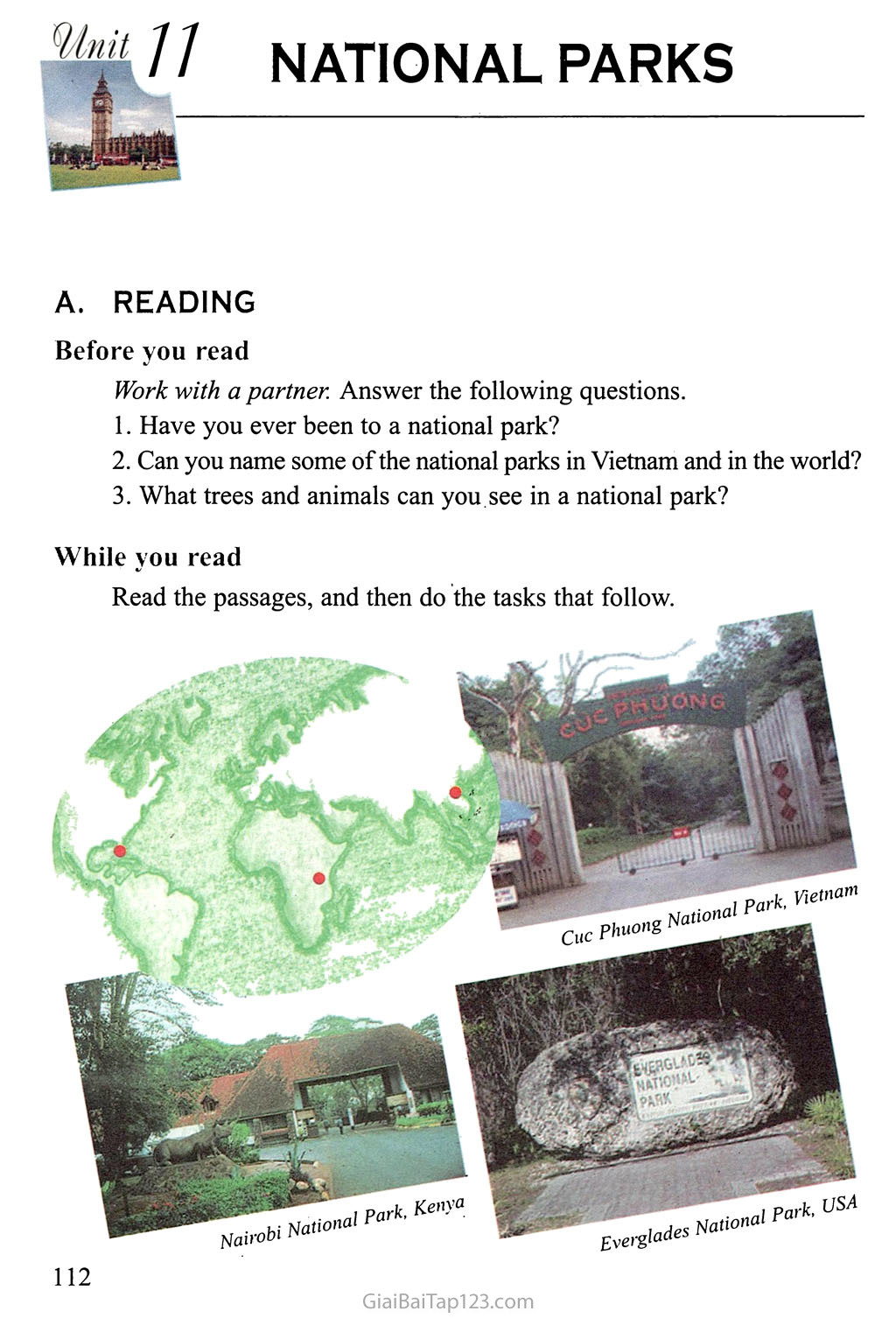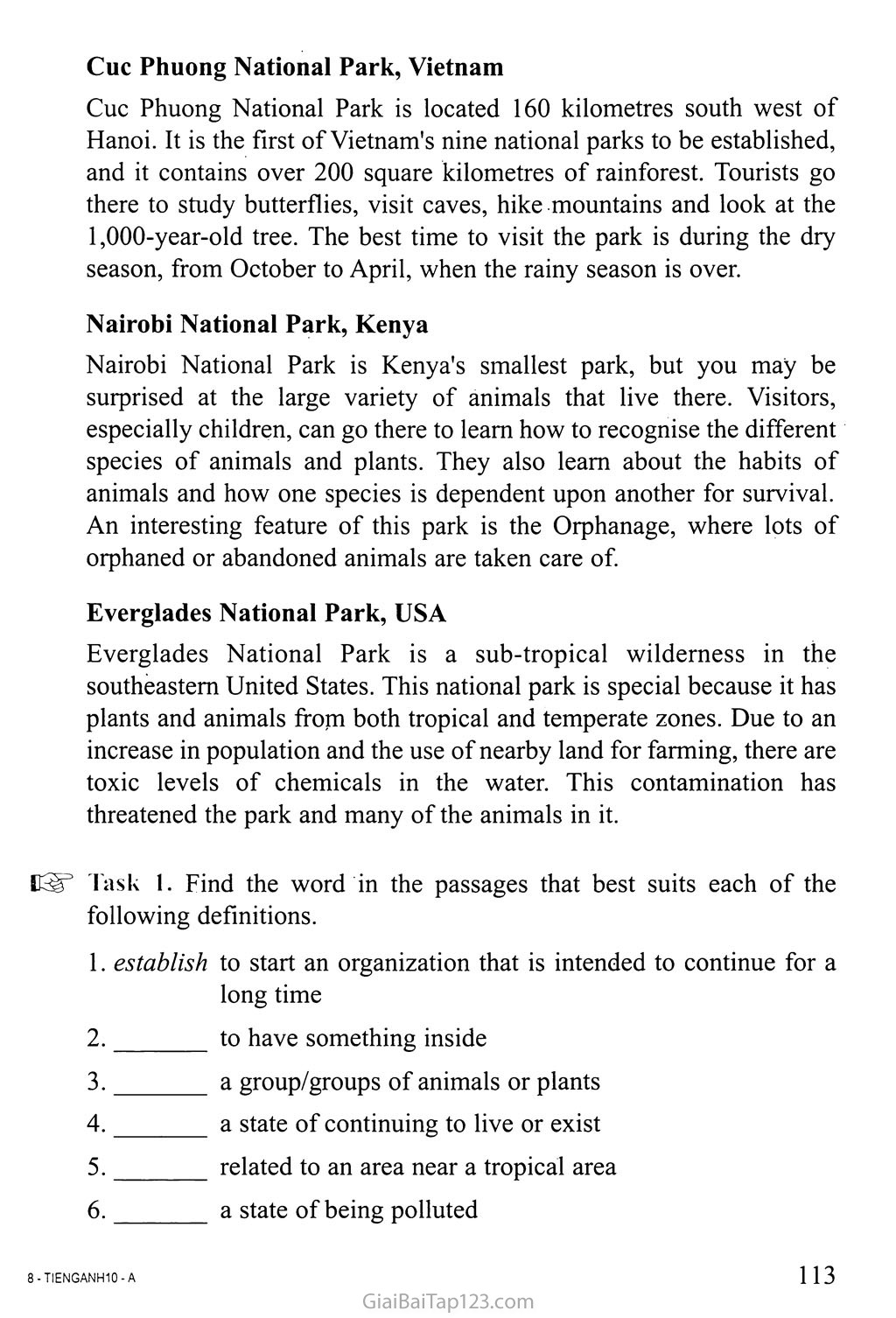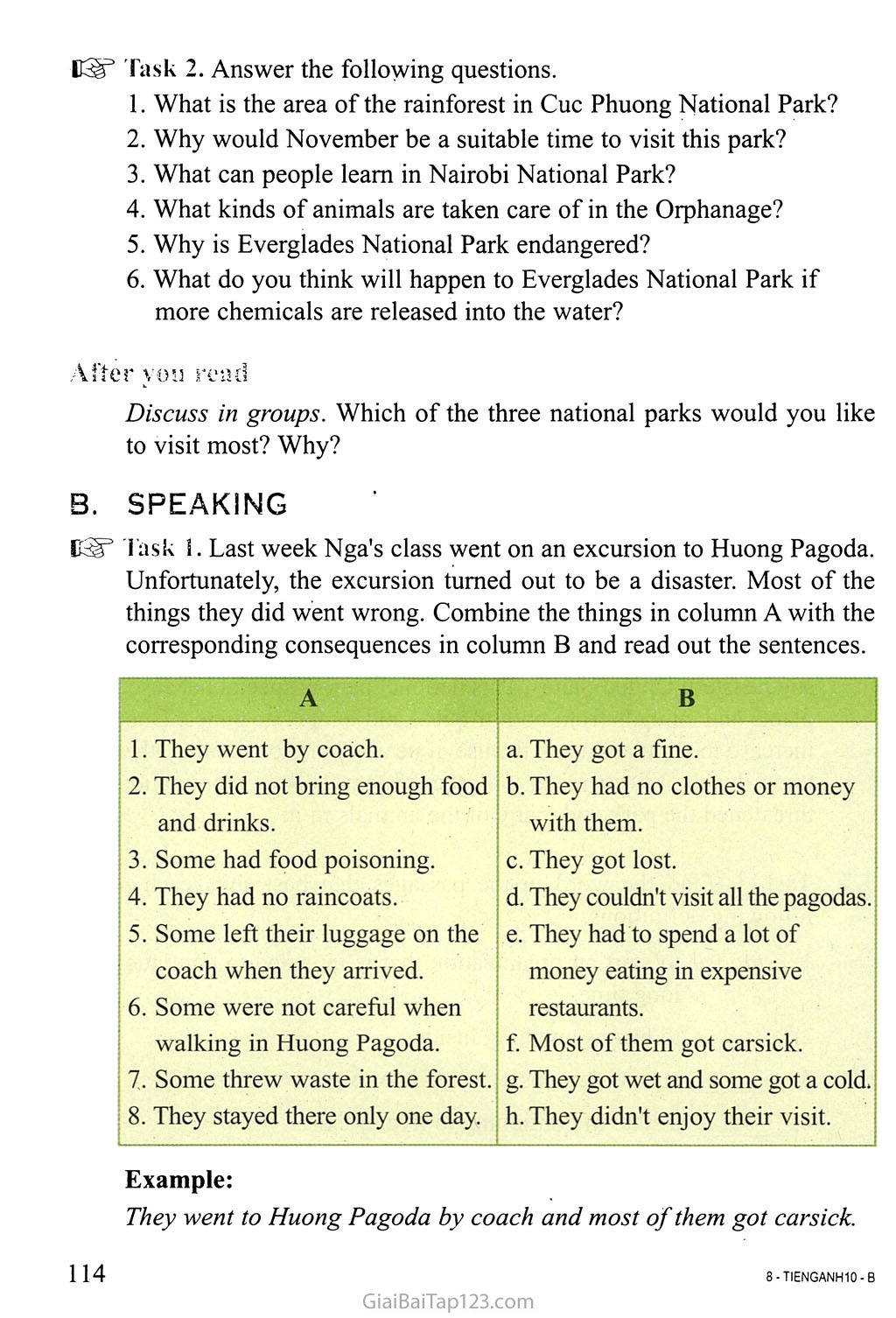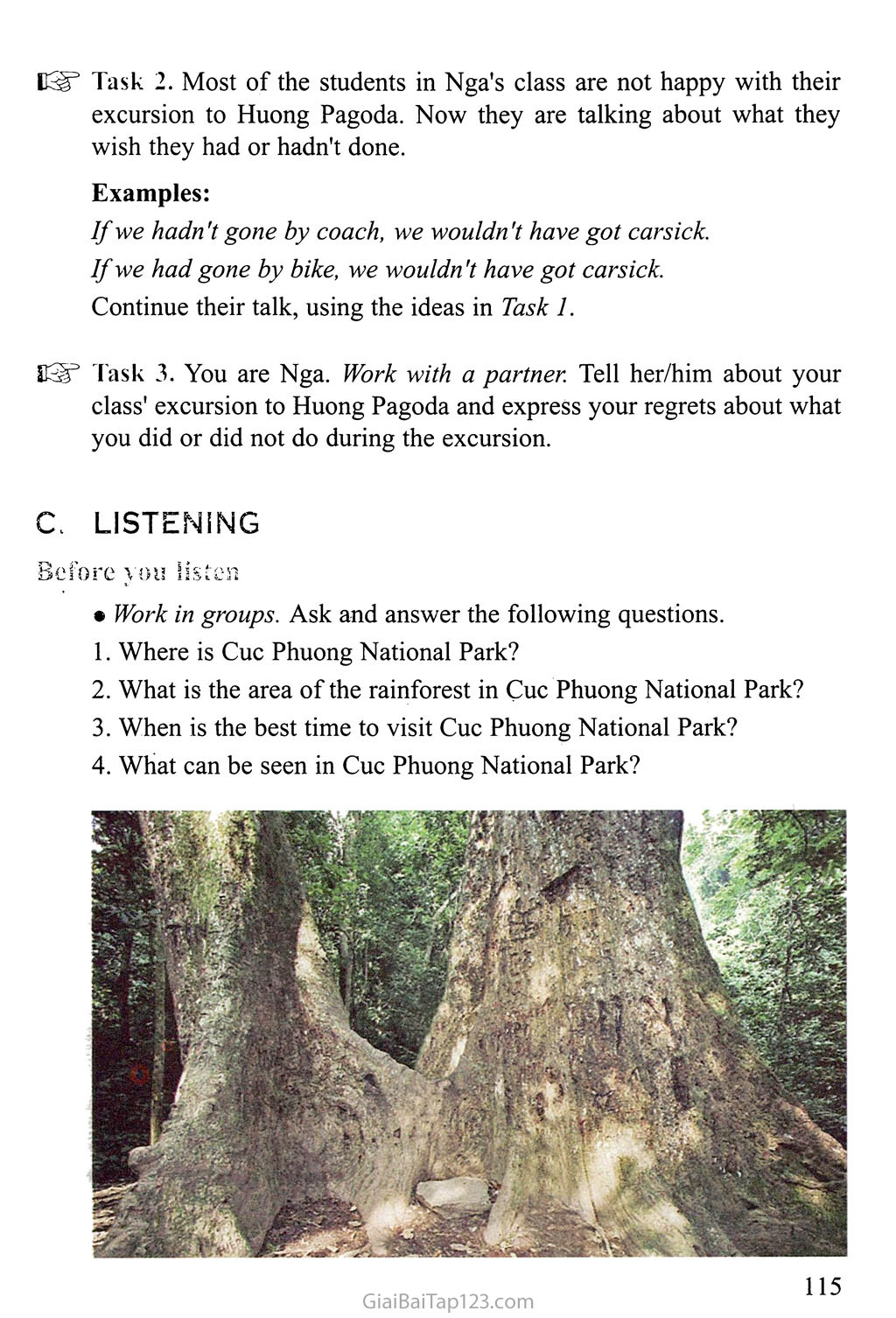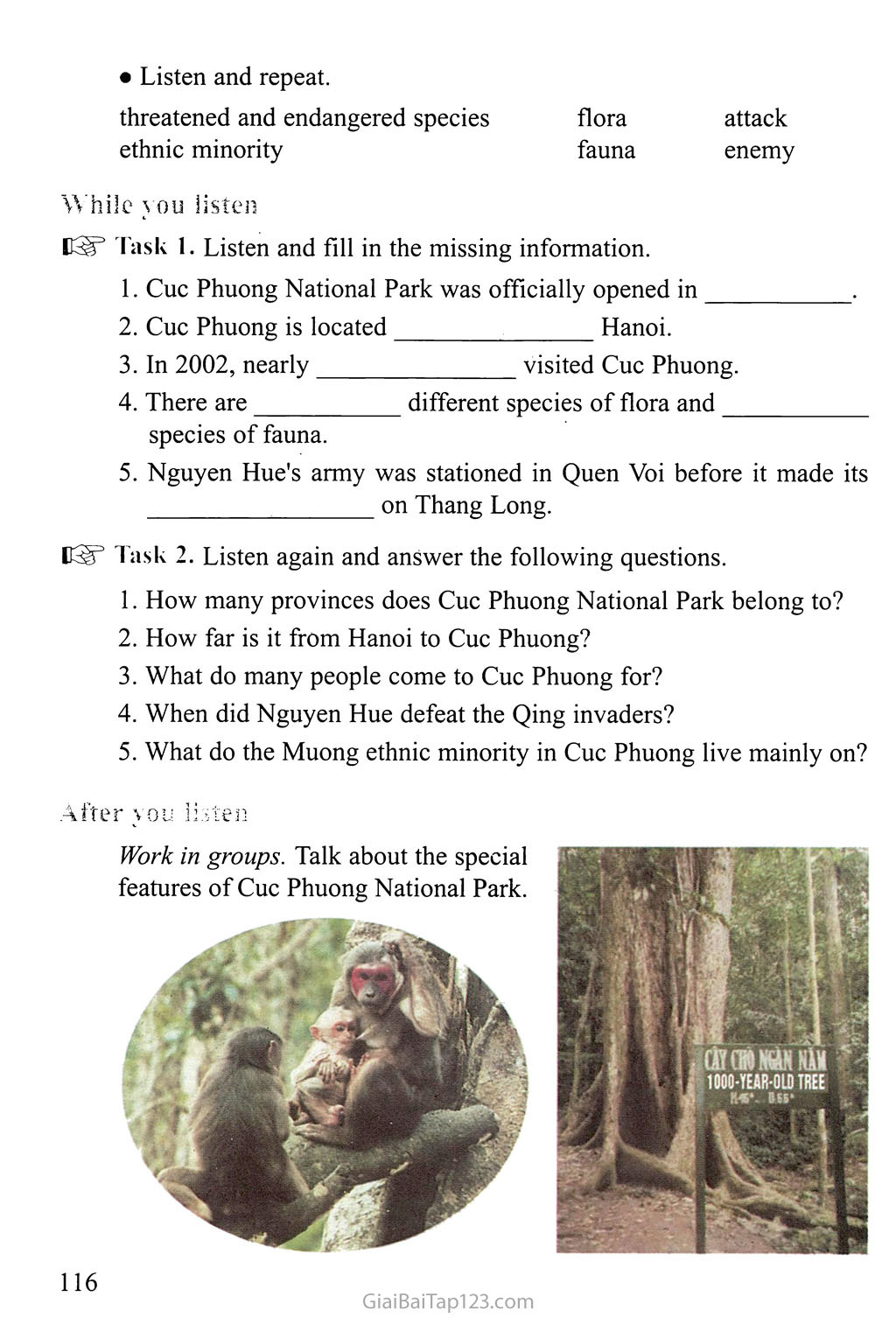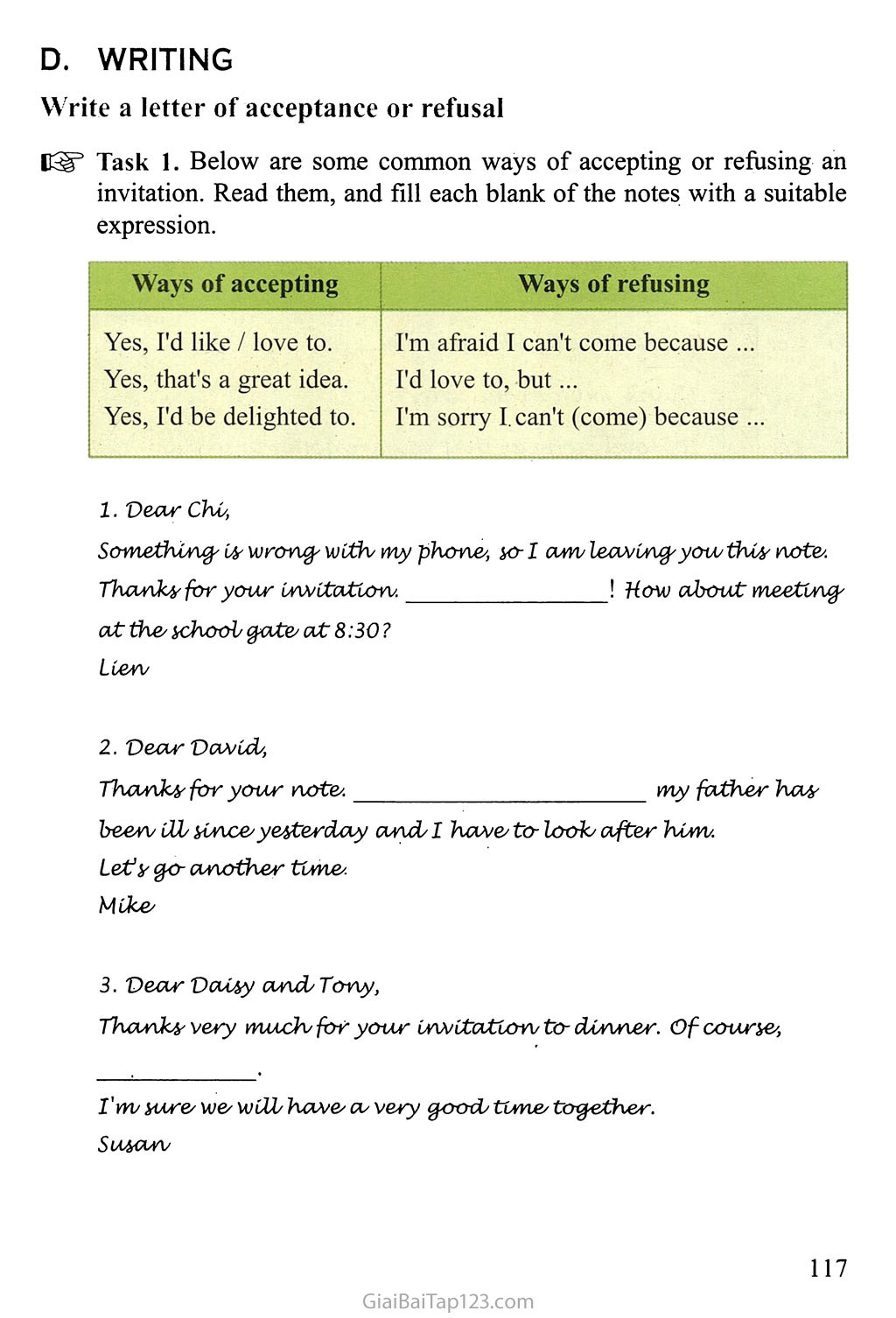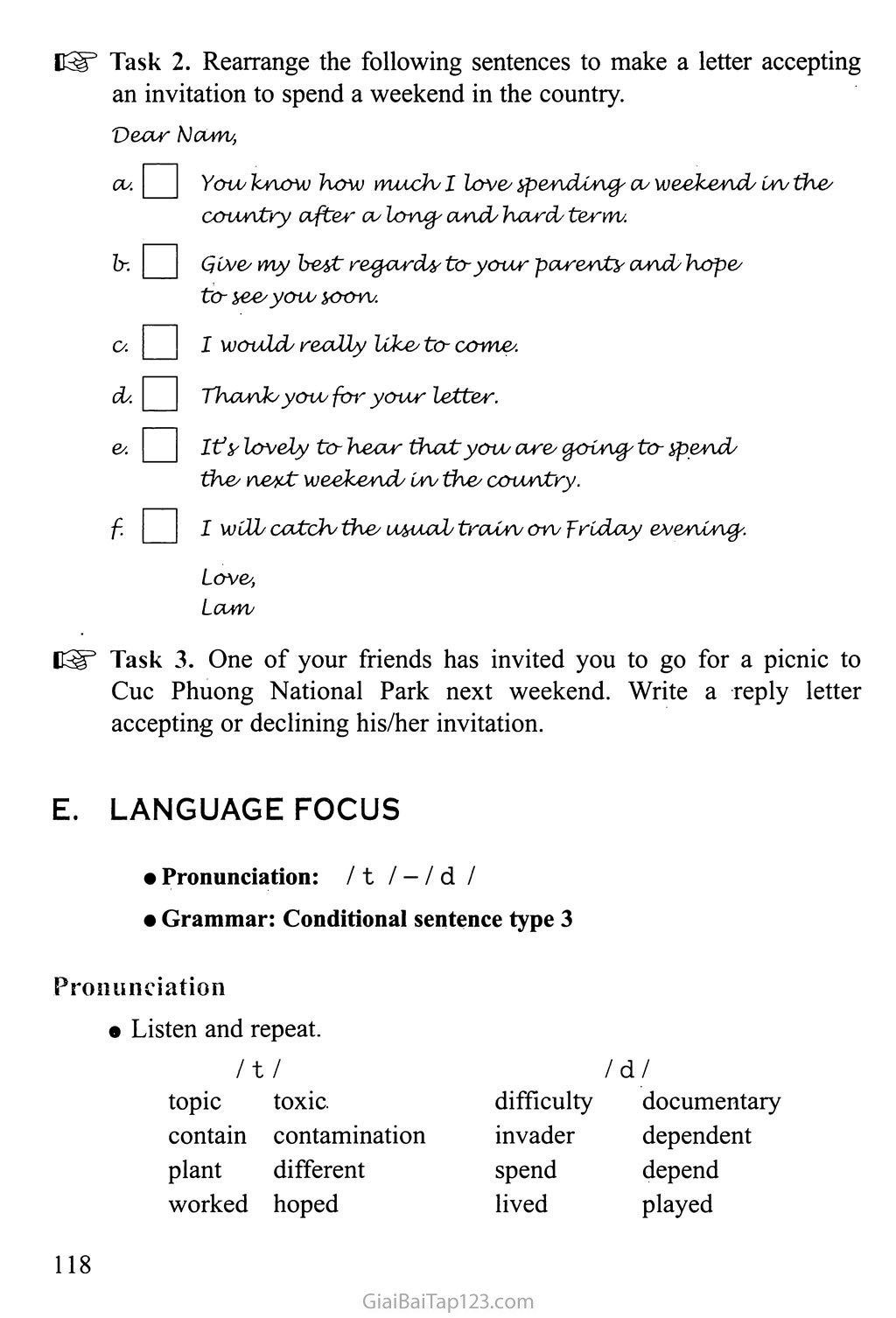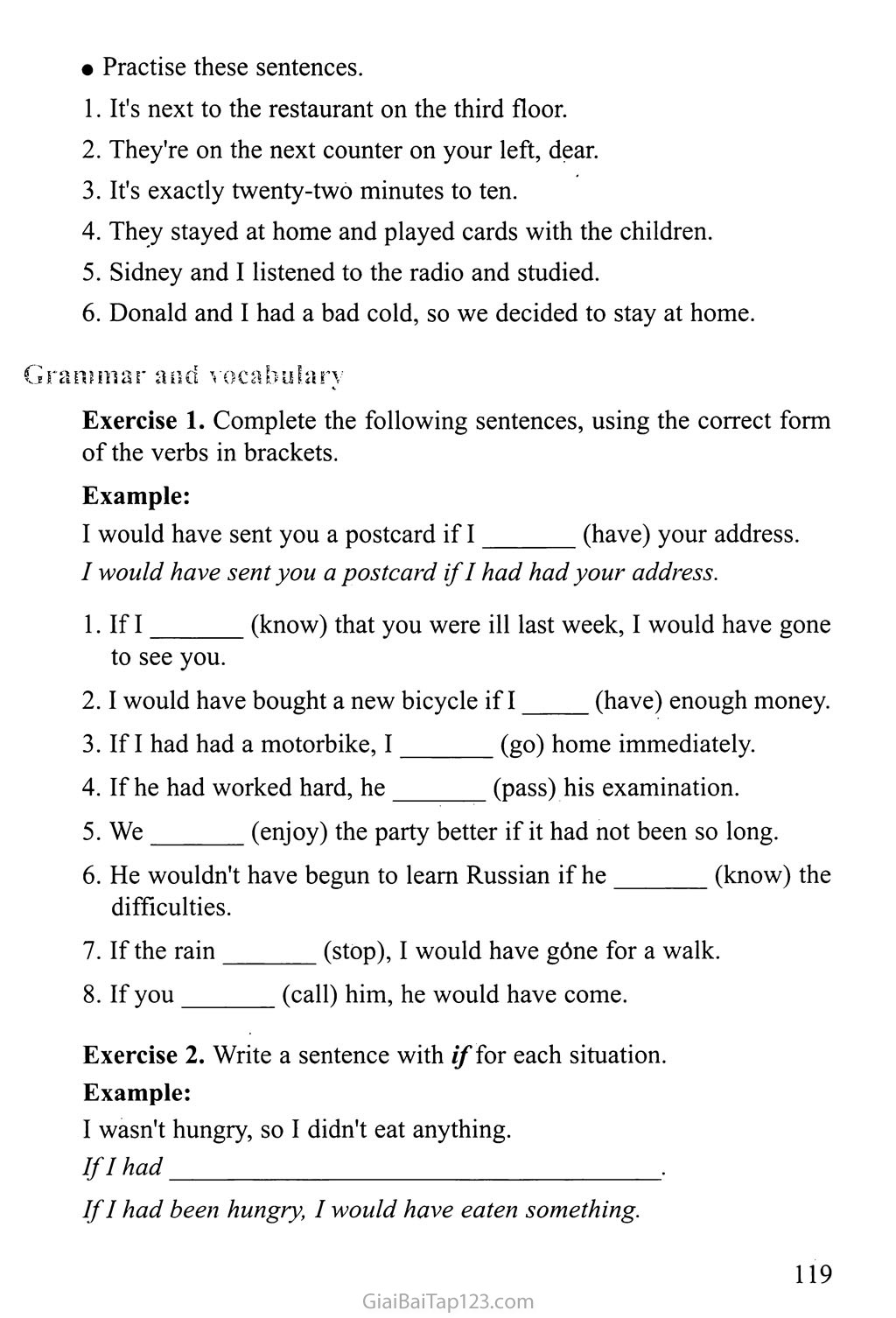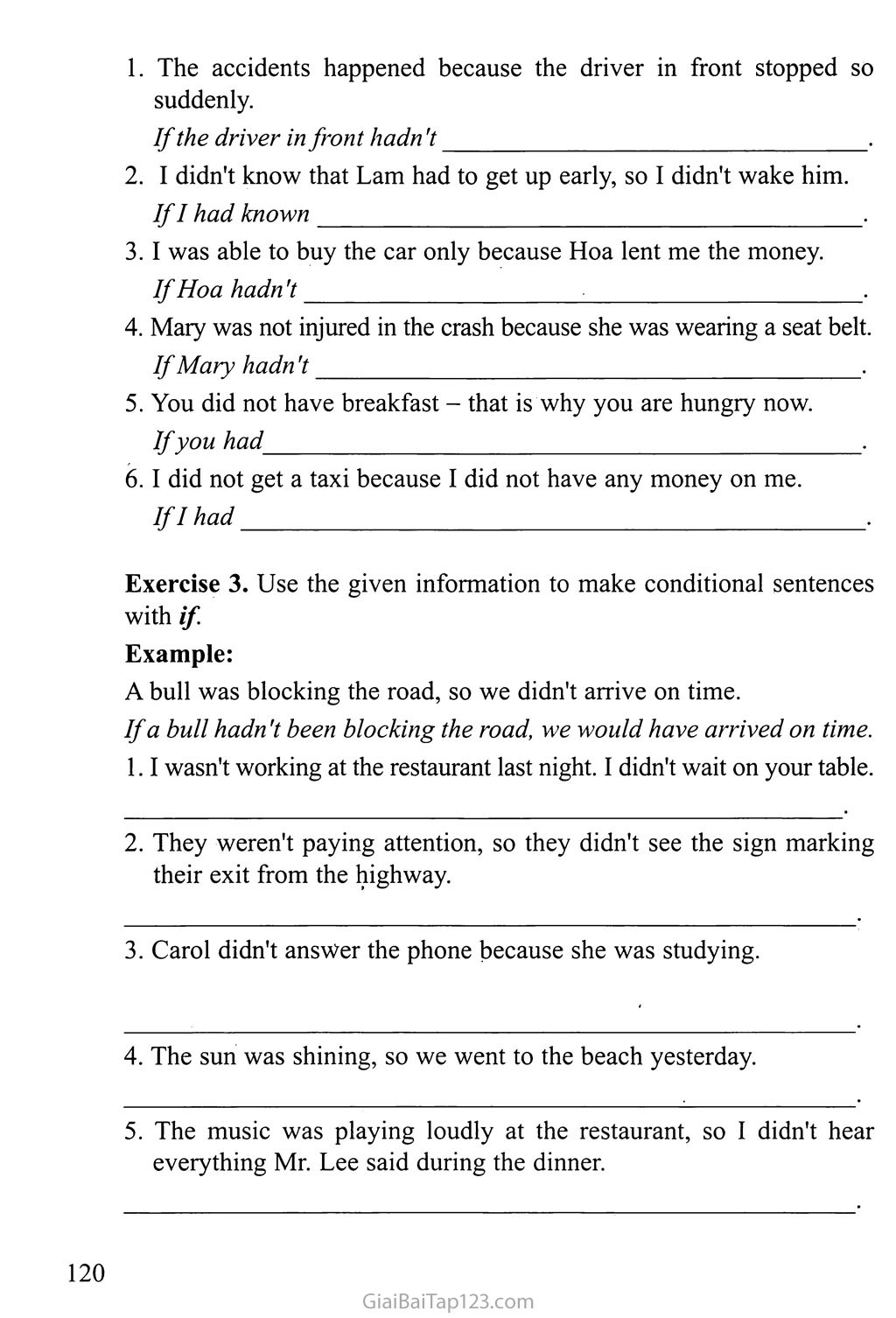SGK Tiếng Anh 10 - Unit 11: NATIONAL PARKS
NATIONAL PARKS A. READING Before you read Work with a partner. Answer the following questions. Have you ever been to a national park? Can you name some of the national parks in Vietnam and in the world? What trees and animals can you. see in a national park? While you read Read the passages, and then do the tasks that follow. Cue Phuong National Park, Vietnam Cue Phuong National Park is located 160 kilometres south west of Hanoi. It is the first of Vietnam's nine national parks to be established, and it contains over 200 square kilometres of rainforest. Tourists go there to study butterflies, visit caves, hike mountains and look at the 1,000-year-old tree. The best time to visit the park is during the dry season, from October to April, when the rainy season is over. Nairobi National Park, Kenya Nairobi National Park is Kenya's smallest park, but you may be surprised at the large variety of animals that live there. Visitors, especially children, can go there to learn how to recognise the different species of animals and plants. They also learn about the habits of animals and how one species is dependent upon another for survival. An interesting feature of this park is the Orphanage, where lots of orphaned or abandoned animals are taken care of. Everglades National Park, USA Everglades National Park is a sub-tropical wilderness in the southeastern United States. This national park is special because it has plants and animals from both tropical and temperate zones. Due to an increase in population and the use of nearby land for farming, there are toxic levels of chemicals in the water. This contamination has threatened the park and many of the animals in it. KẫT Task 1. Find the word in the passages that best suits each of the following definitions. establish to start an organization that is intended to continue for a long time to have something inside a group/groups of animals or plants a state of continuing to live or exist related to an area near a tropical area a state of being polluted ICA’ Task 2. Answer the following questions. What is the area of the rainforest in Cue Phuong National Park? Why would November be a suitable time to visit this park? What can people learn in Nairobi National Park? What kinds of animals are taken care of in the Orphanage? Why is Everglades National Park endangered? What do you think will happen to Everglades National Park if more chemicals are released into the water? After you read Discuss in groups. Which of the three national parks would you like to visit most? Why? B. SPEAKING Task '. Last week Nga's class went on an excursion to Huong Pagoda. Unfortunately, the excursion turned out to be a disaster. Most of the things they did went wrong. Combine the things in column A with the corresponding consequences in column B and read out the sentences. A B They went by coach. They did not bring enough food and drinks. Some had food poisoning. They had no raincoats. Some left their luggage on the coach when they arrived. Some were not careful when walking in Huong Pagoda. Some threw waste in the forest. They stayed there only one day. They got a fine. They had no clothes or money with them. They got lost. They couldn't visit all the pagodas. They had to spend a lot of money eating in expensive restaurants. Most of them got carsick. They got wet and some got a cold, They didn't enjoy their visit. Example: They went to Huong Pagoda by coach and most of them got carsick. IW Task 2. Most of the students in Nga's class are not happy with their excursion to Huong Pagoda. Now they are talking about what they wish they had or hadn't done. Examples: If we hadn't gone by coach, we wouldn't have got carsick. If we had gone by bike, we wouldn't have got carsick. Continue their talk, using the ideas in Task 1. IW Task 3. You are Nga. Work with a partner. Tell her/him about your class' excursion to Huong Pagoda and express your regrets about what you did or did not do during the excursion. c. LISTENING Before you listen • Work in groups. Ask and answer the following questions. Where is Cue Phuong National Park? What is the area of the rainforest in Cue Phuong National Park? When is the best time to visit Cue Phuong National Park? What can be seen in Cue Phuong National Park? • Listen and repeat. threatened and endangered species flora attack ethnic minority fauna enemy While you listen KIT Task 1. Listen and fill in the missing information. Cue Phuong National Park was officially opened in . Cue Phuong is located Hanoi. In 2002, nearly visited Cue Phuong. There are different species of flora and species of fauna. Nguyen Hue's army was stationed in Quen Voi before it made its . on Thang Long. IW Task 2. Listen again and answer the following questions. How many provinces does Cue Phuong National Park belong to? How far is it from Hanoi to Cue Phuong? What do many people come to Cue Phuong for? When did Nguyen Hue defeat the Qing invaders? What do the Muong ethnic minority in Cue Phuong live mainly on? After you listen Work in groups. Talk about the special features of Cue Phuong National Park. D. WRITING Write a letter of acceptance or refusal E7K3 Task 1. Below are some common ways of accepting or refusing an invitation. Read them, and fdl each blank of the notes with a suitable expression. Ways of accepting Ways of refusing Yes, I'd like / love to. Yes, that's a great idea. Yes, I'd be delighted to. I'm afraid I can't come because ... I'd love to, but... I'm sorry I.can't (come) because ... Dear chis, Somethings wrongs with/ my phone/, iO1 am leavingyou/ thó/ notes. Thank/y for your Invitations. ! How about meeting at the/ ỊÒhooỉs gates at 8:30? Liens Dear Davids, Thankv for your notes. my father hav been Ms itnces yesterday and I haves to looks after htms. let ỳ go another tones. Mikes Dear Daứy and Tony, Thankvvery muths for your invitation to dinner. of court#/, Tvns bure/we/wM/haves a/very goods times together. SiUfOsns Kg3 Task 2. Rearrange the following sentences to make a letter accepting an invitation to spend a weekend in the country. Dear Nam, a/. I [ You/ know how much/1 love/ tv weekend/ £n/ the/ c<rorfery offer O/fengf/and hard ter uv N. I I d fee- my heyt re^orcfe to your parertv and/ hope/ to- see/you/ ẮOon/. o. I I I would/really like/to come/. d/. I 1 Thank/yoa for your letter. e/. I I ItS' lovely to hear that you/ are/ going/ to spend/ the/ next weekend/ in- the/ country. f. I I I will/catch/the/asuattratn/ovv TrCday evening/. Love/, Lam Kg* Task 3. One of your friends has invited you to go for a picnic to Cue Phuong National Park next weekend. Write a reply letter accepting or declining his/her invitation. E. LANGUAGE FOCUS Pronunciation: / t / — / d / Grammar: Conditional sentence type 3 Pronunciation • Listen and repeat. /t / /d/ topic toxic. difficulty documentary contain contamination invader dependent plant different spend depend worked hoped lived played • Practise these sentences. It's next to the restaurant on the third floor. They're on the next counter on your left, dear. It's exactly twenty-two minutes to ten. They stayed at home and played cards with the children. Sidney and I listened to the radio and studied. Donald and I had a bad cold, so we decided to stay at home. Grammar and vocabulary Exercise 1. Complete the following sentences, using the correct form of the verbs in brackets. Example: I would have sent you a postcard if I (have) your address. I would have sent you a postcard if I had had your address. If I (know) that you were ill last week, I would have gone to see you. 2.1 would have bought a new bicycle if I (have) enough money. If I had had a motorbike, I (go) home immediately. If he had worked hard, he (pass) his examination. We (enjoy) the party better if it had not been so long. He wouldn't have begun to learn Russian if he (know) the difficulties. If the rain (stop), I would have gone for a walk. If you (call) him, he would have come. Exercise 2. Write a sentence with if for each situation. Example: I wasn't hungry, so I didn't eat anything. If I had . If I had been hungry, I woidd have eaten something. The accidents happened because the driver in front stopped so suddenly. Exercise 3. Lise the given information to make conditional sentences with if Example: A bull was blocking the road, so we didn't arrive on time. If a bull hadn't been blocking the road, we would have arrived on time. 1.1 wasn't working at the restaurant last night. I didn't wait on your table. They weren't paying attention, so they didn't see the sign marking their exit from the highway. Carol didn't answer the phone because she was studying. The sun was shining, so we went to the beach yesterday. The music was playing loudly at the restaurant, so I didn't hear everything Mr. Lee said during the dinner.

